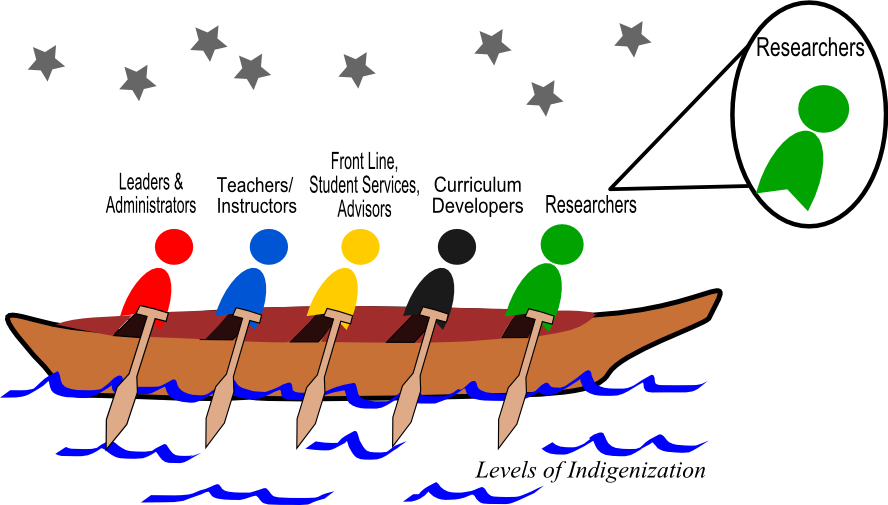Overview
Purpose of this guide
A Guide for Researchers is part of Pulling Together, an open professional learning series developed for staff across post-secondary institutions in British Columbia. Guides in the series include Foundations Guide; A Guide for Leaders and Administrators; A Guide for Curriculum Developers; A Guide for Teachers and Instructors; A Guide for Front-line Staff, Student Services, and Advisors; and A Guide for Researchers.
These guides are the result of the Indigenization Project, a collaboration between BCcampus and the Ministry of Advanced Education and Skills Training. The project was supported by a steering committee of Indigenous education leaders from B.C. universities, colleges, and institutes, the First Nations Education Steering Committee, the Indigenous Adult and Higher Learning Association, and Métis Nation British Columbia.
These guides are intended to support the systemic change occurring across post-secondary institutions through Indigenization, decolonization, and reconciliation. A guiding principle from the Truth and Reconciliation Commission of Canada process states why this change is happening.
Reconciliation requires constructive action on addressing the ongoing legacies of colonialism that have had destructive impacts on Aboriginal peoples’ education, cultures and languages, health, child welfare, the administration of justice, and economic opportunities and prosperity. (2015, p. 3)
We all have a role to play. As noted by Universities Canada, “[h]igher education offers great potential for reconciliation and a renewed relationship between Indigenous and non-Indigenous people in Canada” (2015). Similarly, Colleges and Institutes Canada notes that “Indigenous education will strengthen colleges’ and institutes’ contribution to improving the lives of learners and communities” (2015). These guides provide a way for all faculty and staff to Indigenize their practice in post-secondary education.

The Indigenization Project can be described as an evolving story of how diverse people can journey forward in a canoe (Figure 0.1). In Indigenous methodology, stories emphasize our relationships with our environment, with our communities, and with each other. To stay on course, we are guided by the stars in the sky, with each star a project principle: deliver holistically, learn from one another, work together, share strengths, value collaboration, deepen the learning, engage respectfully, and learn to work in discomfort. As we look ahead, we do not forget our past.
The canoe holds Indigenous people and the key people in post-secondary education whose roles support, lead, and build Indigenization. Our combined strengths give us balance and the ability to steer and paddle in unison as we sit side by side. The paddles are the open resources. As we learn to pull together, we understand that our shared knowledge makes us stronger and makes us one.
The perpetual motion and depth of water reflects the evolving process of Indigenization. Indigenization is relational and collaborative and involves various levels of transformation, from inclusion and integration to infusion of Indigenous perspectives and approaches in education. As we learn together, we ask new questions, so we continue our journey with curiosity and optimism, always looking for new stories to share.
We hope these guides support you in your learning journey. As open education resources, they can be adapted to fit local contexts, in collaboration with Indigenous Peoples who connect with and advise your institution. We expect that as more educators use and revise these guides, they will evolve over time.
How to use and adapt this guide
A Guide for Researchers looks at systemic change of research by exploring research practice and process with Indigenous Peoples and knowledge. This change rests with researchers and teachers of research methods in post-secondary education. The Kwaḱwala term hiłḱala means one who is allowed or has permission. The term reflects a researcher’s responsibility and ongoing role in Indigenous research. While it takes a person a lifetime to develop into this role, it is not done alone: there are helpers, guides, and teachers along the way.
This guide is a helper for Indigenous and non-Indigenous researchers and those responsible for post-secondary research. You can use the guide in various ways:
- To provide a grounding in Indigenization, decolonization, and reconciliation approaches
- To practice how to place yourself as an ally or supporter of Indigenous revitalization through research practice
- To work with others to discuss how to Indigenize research paradigms to support reconciliation pathways in your post-secondary institution and community
This guide can be used as part of a learning community or in a group learning experience, adapting and augmenting it to include Indigenization pathways at your institution for Indigenous students and communities.
A Guide for Researchers is not a definitive resource, as First Nations, Métis, and Inuit perspectives and approaches are diverse across the province. We invite you to augment it with your own stories and examples and, where possible, include Indigenous voices and perspectives from your area in the materials.
To learn more about Indigenous-Canadian relationships since contact, please see the Foundations Guide.
Note: For a technical description of how to adapt this guide please see Appendix C: Adapting this Guide.
Media Attributions
- Figure 0.1: Pulling Together: A Canoe Journey (“Researcher” emphasis) by Dianne Biin is used under a CC BY 4.0 License.
A relational and collaborative process that involves various levels of transformation, from inclusion and integration to infusion of Indigenous perspectives and approaches in education.
A Kwaḱwala term meaning one who is allowed or has permission. The term reflects a researcher’s responsibility and ongoing role in Indigenous research. While it takes a person a lifetime to develop into this role, it is not done alone; there are helpers, guides, and teachers along the way. See First Voices: Kwaḱwala Phrases.
A recognition of the power imbalances and the harm of normalizing Western knowledge in education as the only way of knowing and all other knowledge systems and practices as lesser and invalid. Deconstructing colonial ideologies involves valuing and revitalizing Indigenous knowledges and approaches and questioning biases and assumptions.
A process that requires both Indigenous and non-Indigenous peoples to identify, recognize, acknowledge, and accept their respective responsibilities to change relationships; build common understanding; and make genuine, long-lasting change to Canadian society.

